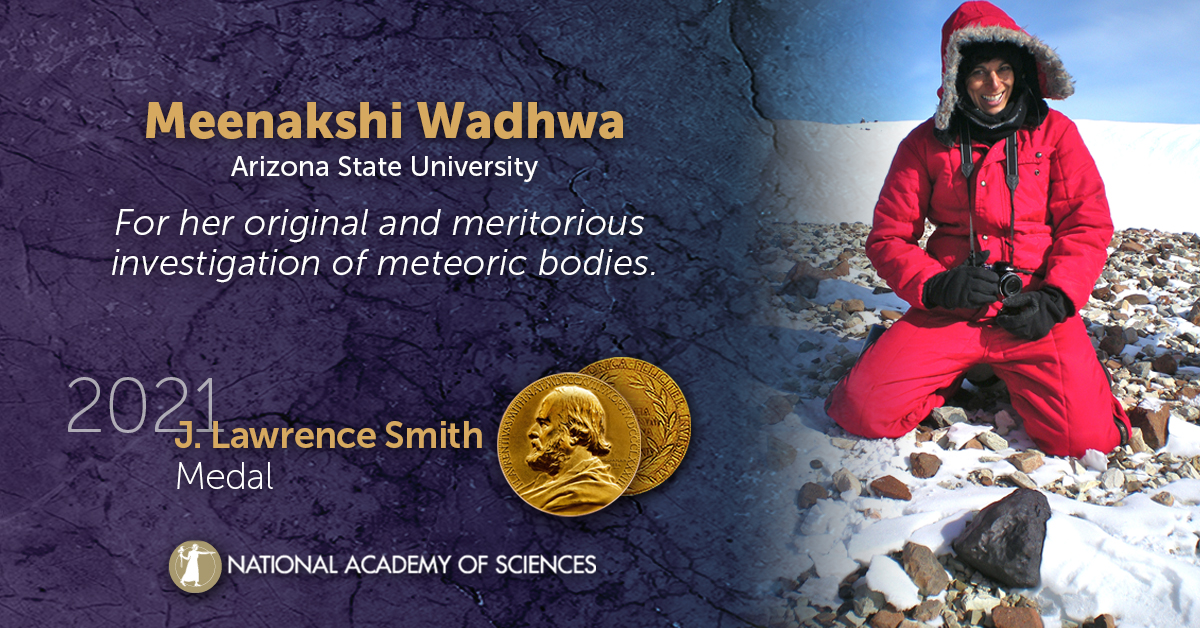National Academy of Sciences honors Meenakshi Wadhwa with J. Lawrence Smith Medal

School of Earth and Space Exploration Director Meenakshi Wadhwa has been awarded the 2021 J. Lawrence Smith Medal by the National Academy of Sciences. Photo by ASU
The National Academy of Sciences has announced that School of Earth and Space Exploration Director Meenakshi Wadhwa will be honored with the 2021 J. Lawrence Smith Medal for her extraordinary scientific achievements.
“Wadhwa has deepened the world’s understanding of the evolutionary history of the solar system through her significant contributions to the sciences of cosmochemistry, solar system chronology, meteoritics and trace element geochemistry,” the academy stated in a release.
The J. Lawrence Smith Medal is awarded every three years for recent original and meritorious investigations of meteoric bodies. The award includes a $50,000 prize and was established as a gift from Sarah Julia Smith in memory of her husband. It has been presented since 1888.
“Professor Wadhwa is well-deserving of this prestigious award from the National Academy of Sciences,” said Arizona State University Provost Pro Tempore Nancy Gonzales. “Her trailblazing scholarship is leading to discoveries that are advancing her field and deepening our understanding of the cosmos. She is a committed scholar and leader who represents the best of ASU’s academic community.”
Among Wadhwa’s many groundbreaking accomplishments that led to this recognition is her use of long-lived radioisotopes to refine the age of the solar system, in the process correcting the commonly used ratio for decay. Her studies of the trace elements and stable isotopes (especially hydrogen) in meteoritic minerals have also allowed her to develop new ways to interpret that data and reveal planetary secrets, particularly those of Mars.
“I’m truly humbled when I think of those who were awarded this medal before me,” Wadhwa said. “But I’m also very honored, not just for myself but also for all the amazing students and postdoctoral researchers I’ve been so fortunate to work with over the years.”
In addition to serving as director of the School of Earth and Space Exploration, Wadhwa is currently on the NASA Advisory Council and chairs its science committee; she also is serving on the joint NASA-ESA Mars Sample Planning Group. She was president of the Meteoritical Society for the past two years, and recently also served on the Mars Sample Return Independent Review Board and the National Academies Space Studies Board.

National Academy of Sciences announcement of the 2021 J. Lawrence Smith Medal to ASU’s Meenakshi Wadhwa. Credit: NAS/ASU
Wadhwa is among 20 individuals that the academy is recognizing for their achievements in a wide range of fields spanning the physical, biological, social and medical sciences. In addition to Wadhwa, award recipients include representatives from Brown University, Harvard University & Smithsonian, Howard Hughes Medical Institute, George Washington University, Massachusetts Institute of Technology, Montana State University, Pennsylvania State University, Stanford University, University of British Columbia, University of California at Berkeley, University of Pennsylvania and Yale University. They will be honored in a virtual ceremony during the National Academy of Sciences' 158th annual meeting April 24–26.
About the National Academy of Sciences
The National Academy of Sciences is a private, nonprofit institution that was established under a congressional charter signed by President Abraham Lincoln in 1863. It recognizes achievement in science by election to membership, and — with the National Academy of Engineering and the National Academy of Medicine — provides science, engineering and health policy advice to the federal government and other organizations.
More Science and technology

How AI is changing college
Artificial intelligence is the “great equalizer,” in the words of ASU President Michael Crow.It’s compelled industries, including…

The Dreamscape effect
Written by Bret HovellSeventh grader Samuel Granado is a well-spoken and bright student at Villa de Paz Elementary School in…

Research expenditures ranking underscores ASU’s dramatic growth in high-impact science
Arizona State University has surpassed $1 billion in annual research funding for the first time, placing the university among the…